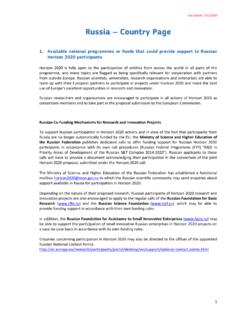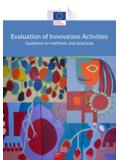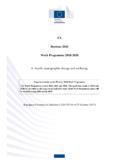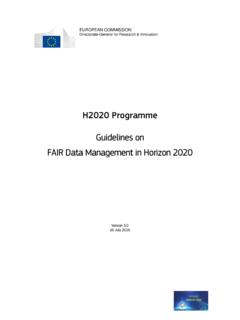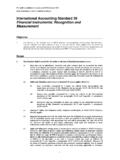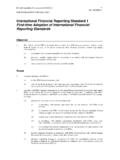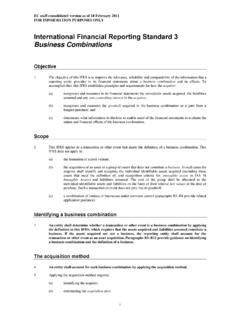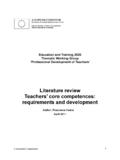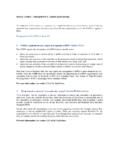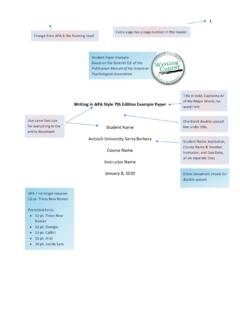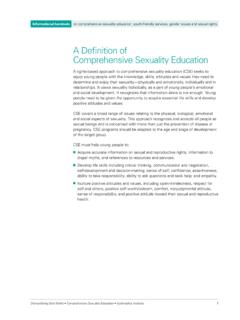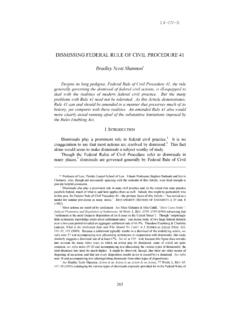Transcription of E U R O P E 2 0 2 0
1 EUROPEAN COMMISSION. EUROPE 2020. A European strategy for smart, sustainable and inclusive growth 1 02/03/2010 13:21:44. Preface 2010 must mark a new beginning. I want Europe to emerge stronger from the economic and financial crisis. Economic realities are moving faster than political realities , as we have seen with the global impact of the financial crisis. We need to accept that the increased economic interdependence demands also a more determined and coherent response at the political level. The last two years have left millions unemployed. It has brought a burden of debt that will last for many years. It has brought new pressures on our social cohesion. It has also exposed some fundamental truths about the challenges that the European economy faces. And in the meantime, the global economy is moving forward. How Europe responds will determine our future. The crisis is a wake-up call, the moment where we recognise that "business as usual" would consign us to a gradual decline, to the second rank of the new global order.
2 This is Europe's moment of truth. It is the time to be bold and ambitious. Our short-term priority is a successful exit from the crisis. It will be tough for some time yet but we will get there. Significant progress has been made on dealing with bad banks, correcting the financial markets and recognising the need for strong policy coordination in the eurozone. To achieve a sustainable future, we must already look beyond the short term. Europe needs to get back on track. Then it must stay on track. That is the purpose of Europe 2020. It's about more jobs and better lives. It shows how Europe has the capability to deliver smart, sustainable and inclusive growth, to find the path to create new jobs and to offer a sense of direction to our societies. European leaders have a common analysis on the lessons to be drawn from the crisis. We also share a common sense of urgency on the challenges ahead. Now we jointly need to make it happen. Europe has many strengths.
3 We have a talented workforce, we have a powerful technological and industrial base. We have an internal market and a single currency that have successfully helped us resist the worst. We have a tried and tested social market economy. We must have confidence in our ability to set an ambitious agenda for ourselves and then gear our efforts to delivering it. The Commission is proposing five measurable EU targets for 2020 that will steer the process and be translated into national targets: for employment; for research and innovation; for climate change and energy; for education; and for combating poverty. They represent the direction we should take and will mean we can measure our success. They are ambitious, but attainable. They are backed up by concrete proposals to make sure they are delivered. The flagship initiatives set out in this paper show how the EU can make a decisive contribution. We have powerful tools to hand in the shape of new economic governance, supported by the internal market, our budget, our trade and external economic policy and the disciplines and support of economic and monetary union.
4 The condition for success is a real ownership by European leaders and institutions. Our new agenda requires a coordinated European response, including with social partners and civil society. If we act together, then we can fight back and come out of the crisis stronger. We have the new tools and the new ambition. Now we need to make it happen. Jos Manuel BARROSO. EUROPEAN COMMISSION. Brussels, COM(2010) 2020. COMMUNICATION FROM THE COMMISSION. EUROPE 2020. A strategy for smart, sustainable and inclusive growth EN EN. TABLE OF CONTENTS. Executive summary .. 3. 1. A moment of 5. 2. Smart, sustainable and inclusive 8. 3. Missing links and bottlenecks .. 18. 4. Exit from the crisis: first steps towards 22. 5. Delivering results: stronger 25. 6. Decisions for the European Council .. 28. Annexes .. 30. EN 2 EN. EUROPE 2020 STRATEGY. EXECUTIVE SUMMARY. Europe faces a moment of transformation. The crisis has wiped out years of economic and social progress and exposed structural weaknesses in Europe's economy.
5 In the meantime, the world is moving fast and long-term challenges globalisation, pressure on resources, ageing intensify. The EU must now take charge of its future. Europe can succeed if it acts collectively, as a Union. We need a strategy to help us come out stronger from the crisis and turn the EU into a smart, sustainable and inclusive economy delivering high levels of employment, productivity and social cohesion. Europe 2020 sets out a vision of Europe's social market economy for the 21st century. Europe 2020 puts forward three mutually reinforcing priorities: Smart growth: developing an economy based on knowledge and innovation. Sustainable growth: promoting a more resource efficient, greener and more competitive economy. Inclusive growth: fostering a high-employment economy delivering social and territorial cohesion. The EU needs to define where it wants to be by 2020. To this end, the Commission proposes the following EU headline targets: 75 % of the population aged 20-64 should be employed.
6 3% of the EU's GDP should be invested in R&D. The "20/20/20" climate/energy targets should be met (including an increase to 30% of emissions reduction if the conditions are right). The share of early school leavers should be under 10% and at least 40% of the younger generation should have a tertiary degree. 20 million less people should be at risk of poverty. These targets are interrelated and critical to our overall success. To ensure that each Member State tailors the Europe 2020 strategy to its particular situation, the Commission proposes that EU goals are translated into national targets and trajectories. The targets are representative of the three priorities of smart, sustainable and inclusive growth but they are not exhaustive: a wide range of actions at national, EU and international levels will be necessary to underpin them. The Commission is putting forward seven flagship initiatives to catalyse progress under each priority theme: "Innovation Union" to improve framework conditions and access to finance for research and innovation so as to ensure that innovative ideas can be turned into products and services that create growth and jobs.
7 "Youth on the move" to enhance the performance of education systems and to facilitate the entry of young people to the labour market. EN 3 EN. "A digital agenda for Europe" to speed up the roll-out of high-speed internet and reap the benefits of a digital single market for households and firms. "Resource efficient Europe" to help decouple economic growth from the use of resources, support the shift towards a low carbon economy, increase the use of renewable energy sources, modernise our transport sector and promote energy efficiency. "An industrial policy for the globalisation era" to improve the business environment, notably for SMEs, and to support the development of a strong and sustainable industrial base able to compete globally. "An agenda for new skills and jobs" to modernise labour markets and empower people by developing their of skills throughout the lifecycle with a view to increase labour participation and better match labour supply and demand, including through labour mobility.
8 "European platform against poverty" to ensure social and territorial cohesion such that the benefits of growth and jobs are widely shared and people experiencing poverty and social exclusion are enabled to live in dignity and take an active part in society. These seven flagship initiatives will commit both the EU and the Member States. EU-level instruments, notably the single market, financial levers and external policy tools, will be fully mobilised to tackle bottlenecks and deliver the Europe 2020 goals. As an immediate priority, the Commission charts what needs to be done to define a credible exit strategy, to pursue the reform of the financial system, to ensure budgetary consolidation for long-term growth, and to strengthen coordination within the Economic and Monetary Union. Stronger economic governance will be required to deliver results. Europe 2020 will rely on two pillars: the thematic approach outlined above, combining priorities and headline targets.
9 And country reporting, helping Member States to develop their strategies to return to sustainable growth and public finances. Integrated guidelines will be adopted at EU level to cover the scope of EU priorities and targets. Country-specific recommendations will be addressed to Member States. Policy warnings could be issued in case of inadequate response. The reporting of Europe 2020 and the Stability and Growth Pact evaluation will be done simultaneously, while keeping the instruments separate and maintaining the integrity of the Pact. The European Council will have full ownership and be the focal point of the new strategy. The Commission will monitor progress towards the targets, facilitate policy exchange and make the necessary proposals to steer action and advance the EU flagship initiatives. The European Parliament will be a driving force to mobilise citizens and act as co-legislator on key initiatives. This partnership approach should extend to EU committees, to national parliaments and national, local and regional authorities, to social partners and to stakeholders and civil society so that everyone is involved in delivering on the vision.
10 The Commission proposes that the European Council endorses - in March - the overall approach of the strategy and the EU headline targets, and approves - in June - the detailed parameters of the strategy, including the integrated guidelines and national targets. The Commission also looks forward to the views and support of the European Parliament for making Europe 2020 a success. EN 4 EN. 1. A MOMENT OF TRANSFORMATION. The crisis has wiped out recent progress The recent economic crisis has no precedent in our generation. The steady gains in economic growth and job creation witnessed over the last decade have been wiped out our GDP fell by 4% in 2009, our industrial production dropped back to the levels of the 1990s and 23 million people - or 10% of our active population - are now unemployed. The crisis has been a huge shock for millions of citizens and it has exposed some fundamental weaknesses of our economy. The crisis has also made the task of securing future economic growth much more difficult.
